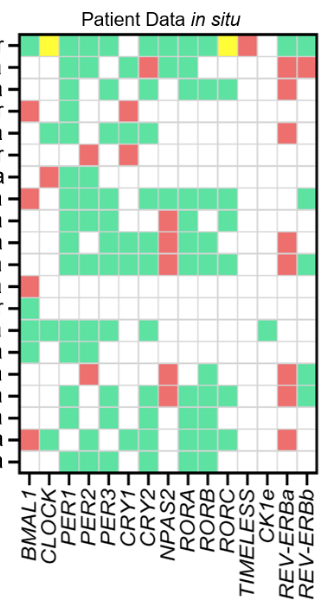Publications
A complete up-to-date list of publications of Robert can be found on Google Scholar and full-texts might be available from the Warwick Research Active Portal (WRAP).
#LittleTediousButReallyGreatResource
A monster rhythmic metabolome review by Tom Hancox, PhD student in Rick Warwick's lab (Liverpool) in collaboration with Tom's co-supervisors Debra Skene (Surrey) and Robert Dallmann. Paper now out in Metabolomics and giving an overview on circadian and diurnal metabolome studies in people.
Cancer clocks in tumourigenesis: the p53 pathway and beyond
 |
Circadian rhythms regulate a vast array of physiological and cellular processes, as well as the hormonal milieu, to keep our cells synchronised to the light-dark cycle. Epidemiologic studies have implicated circadian disruption in the development of breast and other cancers, and numerous clock genes are dysregulated in human tumours. Here we review the evidence that circadian rhythms, when altered at the molecular level, influence cancer growth. We also note some common pitfalls in circadian-cancer research and how they might be avoided to maximise comparable results and minimise misleading data. Studies of circadian gene mutant mice, and human cancer models in vitro and in vivo, demonstrate that clock genes can impact tumourigenesis. Clock genes influence important cancer related pathways, ranging from p53-mediated apoptosis to cell cycle progression. Confusingly, clock dysfunction can be both pro- or anti- tumourigenic in a model and cell type specific manner. Due to this duality, there is no canonical mechanism for clock interaction with tumourigenic pathways. To understand the role of the circadian clock in patients’ tumours requires analysis of the molecular clock status compared to healthy tissue. Novel mathematical approaches are under development, but this remains largely aspirational, and is hampered by a lack of temporal information in publicly available datasets. Current evidence broadly supports the notion that the circadian clock is important for cancer biology. More work is necessary to develop an overarching model of this connection. Future studies would do well to analyse the clock network in addition to alterations in single clock genes. |
Review on how stress increases the susceptibility to herpes simplex virus type 1 primary and recurrent infections
Following primary infection, HSV-1 establishes latency and reactivates under stress. Stress disturbs inner immune Yin–Yang balance, increasing the susceptibility to HSV-1 infection. In latent infection, stress induces changes in hormone level, chromosomal modification and oxidation, thereby disturbing the Yin–Yang balance between HSV-1 and the host defense, leading to recurrent diseases.
